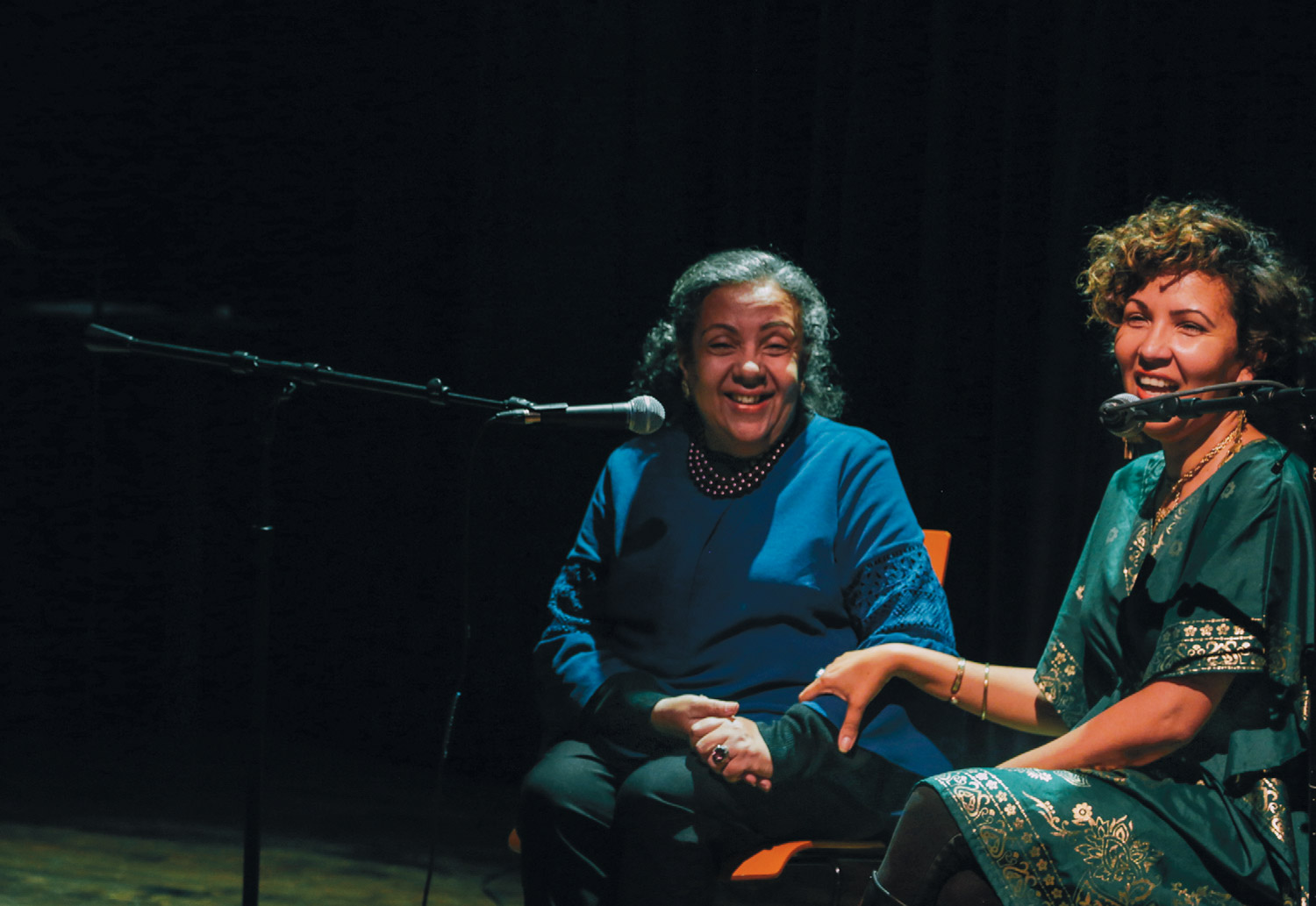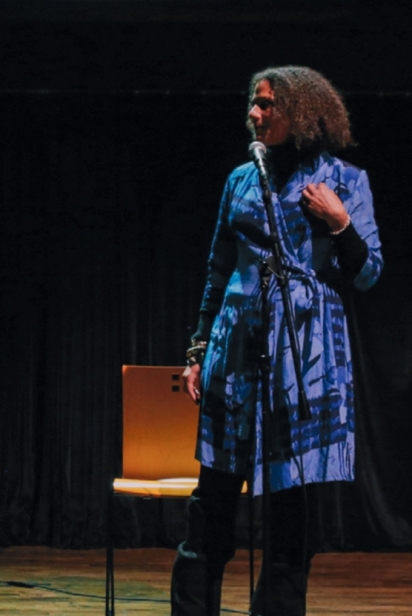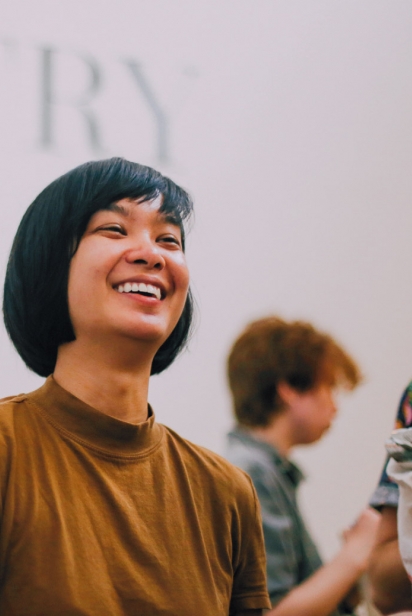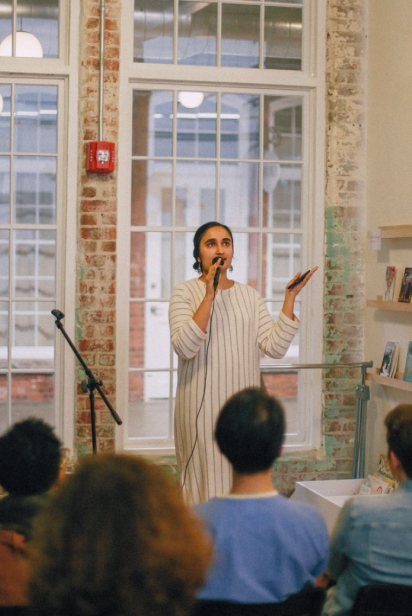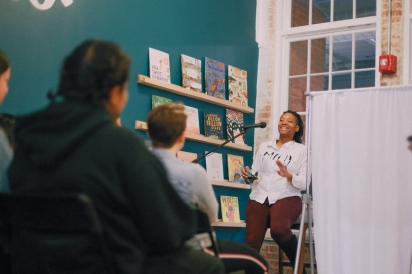Tender Table
Storytelling at the Intersection of Food, Community and Identity
As the sun rose higher in the winter sky, Agueda Villaman selected choice root vegetables from her local market in New York City, stuffed them into a travel bag and boarded a bus to Providence where, a few hours later, she was greeted by her daughter, Sussy Santana. Upon her arrival, Villaman set to work preparing sancocho, a traditional Dominican dish that takes about five hours to assemble and cook into a savory soup.
That evening, mother and daughter were seated on the stage of a black box theater at Brown University, sharing their story of food, family and resilience as roughly 40 people sampled and savored the sancocho Villaman had prepared earlier in the day.
“If you take the time, it’s a labor of love, really,” Santana said, introducing her mother, whom she had invited to share the stage. Santana, a poet, performer and cultural organizer, had been asked to participate in a Tender Table event, a storytelling platform at the intersection of food, community and identity. Santana thought the best way to speak about such things was to call on the wisdom of her mother, literally.
Villaman left the Dominican Republic nearly 30 years ago in search of work in the United States. This move required her to not only leave a beloved homeland, but also her young children; it would be three years before they were able to join her, and the times were trying for all.
“On top of everything that has happened, we never stop cooking,” Santana said, sharing her own words while also translating for her mother, who spoke in Spanish. Villaman agreed, explaining that dishes like sancocho are “good for the belly, and good for the soul.”
She went on to explain how her relationship with food can be spiritual, and how memories seep into recipes, flavoring beloved dishes time and again, no matter the time or the place, becoming the “traditions through food that keep on living.”
Villaman and Santana were two of four featured speakers that February evening, all gathered at Brown’s LGBTQ Center, Tender Table’s host for the night. The other speakers included Sara Elise, the owner of Harvest & Revel, a collaboratively run, women-led, full-service catering company based in Brooklyn, and Valerie Tutson, a Brown graduate, founding member and director of the Rhode Island Black Storytellers, which produces FUNDA FEST, an annual celebration of black storytelling.
Tender Table is a storytelling platform for women, trans and nonbinary folks who are black, indigenous or people of color. Its mission is to “seek out narratives about the sweet, savory, sour and bitter relationships to food and its connections to identity, memory and community.” At each of its events, speakers prepare a dish to be shared with audience members, and usually tie this dish into the story they share.
The idea for these events originated with Stacey Tran, who moved to Providence about a year ago from Portland, Oregon, the city where she was raised and where she launched Tender Table. A published poet, Tran recently started her second year at Brown University, where she’s pursuing an MFA in literary arts.
Since arriving in Rhode Island, Tran has organized a handful of Tender Table events in and around Providence and Boston, including at AS220 in June and last fall, and at Twenty Stories in Pawtucket in April.
The impetus for creating a storytelling platform for marginalized voices was the 2016 presidential election, Tran said. Seated at Tealux on Thayer Street in Providence on a recent afternoon, she sipped tea and spoke softly about the origins of a platform that started as a pop-up series and now spans two coasts.
Before the election, Tran recalled, she had been attending a lot of poetry readings in Portland, which she found lacking in diversity. In Tran’s opinion, these concerns escalated after Donald Trump was elected as president, as she saw fear spike in black, brown and immigrant communities. So Tran decided to create a similar environment to the poetry readings, but with the specific intention of holding space for minority voices, and for stories connected to food.
“Not everyone felt included in Portland, so I wanted to create a more inclusive event space,” she explained. The platform soon evolved into a space for women, trans and non-binary people who identify as black, indigenous or of color.
Soon after moving to Providence, Tran began networking and telling new connections about the series, looking for a way to incorporate Tender Table into the culture of her new city.
“It was a good way to meet and connect with people here, and a great way to build community for myself,” Tran said, adding that the people she met in Providence were extremely welcoming and left her with the impression that it is a “food-passionate place.”
Her aim is to collaborate with different people and organizations for each event, as hosts and sponsors. A key component of the series is that all of the speakers get paid for their work. Tender Table is donation-based in an effort to not be financially prohibitive, and attendees are assured that no one will be turned away at the door.
Events usually feature three to four speakers, each of whom prepares a dish that somehow relates to the story they share. Stories are generally 15 minutes long, and speakers are asked to prepare food for 50 people— enough for everyone to have a small sample.
“Food is so sensual that it brings up all these memories and emotions,” Tran said, noting these recollections are not necessarily happy, hence the storytelling spectrum of sweet to savory, sour and bitter. “When you bring people together around food, that’s how you get to the most authentic self,” she added.
Growing up, her extended Vietnamese family would often gather around the table, where stories would be shared, usually around a communal “hot pot” accompanied by a platter of food made by a local Vietnamese woman, someone who prepared dishes as a side gig and whom the Portland Vietnamese community knew about through word of mouth.
“Food always felt like a place to celebrate community,” Tran said, explaining that hosting Tender Table events is a natural extension of this family practice.
Connections between food and family, history and recipes, is a common theme of the stories shared, and was woven throughout the stories presented at Twenty Stories in mid-April. This event was similar to the February event, but instead of a black box theater, the setting was a small and brightly lit bookstore in an old mill building. And this time, the audience was served food samples between stories, as opposed to the previous event, when people sampled all the food at the beginning of the evening.
Victoria Huynh, a Vietnamese-American writer and student at Brown, spoke of bitter melon, a popular fruit in Africa, Asia and Latin America. Huynh began with an imagined tale of an Indian merchant traveling across the Indian Ocean during the Monsoon trade, eventually reaching Asia, the land of her ancestors, with whom the merchant would have traded bitter melon seeds. “That’s how it found me,” she said, her voice subdued.
Next, she shared a story of a boat, “but I’m not sure which boat”; she was only certain that the boat held African slaves, who carried bitter melon seeds in their mouths as they were taken from a familiar land to a foreign one. Then, she transported the audience to 1975, when members of her family journeyed to the United States, bitter melon traveling in their memories.
“I like that we don’t try to forget our hardships. We swallow them instead,” she said.
Huynch prepared a bitter melon soup, where the melon was stuffed with meat and served over white rice, to accompany her story. As was expected, the melon was bitter, but the soup was pleasant, a comfort dish made for generations.
Other speakers that night included Star Su, a second-year undergraduate at Brown, who spoke of her grandfather and made three different kinds of focaccia bread; Satpreet Kahlon, a multidisciplinary artist born in Punjab, India, and currently based in Seattle and Providence, who made an Indian dessert, the base of which was shredded carrots and sugar, melded together in an instant pot, a “metaphor for immigrant stories”; and Janaya Kizzie, an artist, writer and the current Arts & Culture Research Fellow with the Rhode Island Council for the Humanities, who made a dessert and did a performance piece exploring race and motherhood.
Angela Zhang, a medical student at Brown, attended her first Tender Table event at Twenty Stories, drawn to a space where women of color and nonbinary folks have the stage. “The power of tasting food during the stories was really immersive,” Zhang said.
For a schedule of upcoming events, to learn how to share your story, collaborate with Tender Table or make a donation, visit TenderTable.com.


